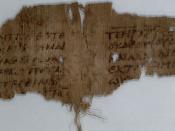Initially, I would like to define certain terms before I come to the major points discussed in the book. The title ÃÂGender and the Nicene CreedÃÂ ÃÂ Dictionary defines Nicene Creed as ÃÂa later creed of closely similar form (Nicene-Constantinopolitan Creed or Constantinopolitan Creed) referred, perhaps erroneously, to the Council of Constantinople (A.D. 381), received universally in the Eastern Church and, with an addition introduced in the 6th century A.D., accepted generally throughout western Christendom.ÃÂThe book discusses a clear-cut and a infiltrating, plus a famous issue and at the same time erudite based topic. It discussed about a gender of the persons of Trinitarian Godhead ÃÂ(Trinity in Christianity stands for the father, the son and the Holy Ghost). This topic is of so importance in Christianity that it is discussed not only in this book but in various other books and as well as the other translations of the same book.
The book is a complete traditional tablet. It not only gives us the valid knowledge about the Nicene Creed but also gives the Greek chronicle of Creed.
The book has ten chapters and in all those chapters, Elizabeth R Geitz puts this gender question so well that it seems that every line of the book is making us to think about this issue. This topic engrosses a lot with our discussions of God that take place in this era. There are people from different schools of thought and no doubt that there are people who donÃÂt fully believe what the book says. But the writer has so beautifully makes us all think in our own perspective.
Geitz writes: "My desire is to help us move from an initial emotional response to feminine traditions of the church to one that is based on sound biblical, historical and theological principles."As already mentioned, Geitz has not only studied this matter herself before writing but she wants us also to think about it and not to follow whatever is been taught to us verbally.
Writers of sacred writ have loads of pictures in their mind when they wrote on God, Jesus and Holy Spirit. But only the benevolent approach seemed to be valid and is being followed. When we read GeitzÃÂs book after going through different scholarÃÂs views and abstruse, we can see clearly that she has dealt this alienating issue of Christianity after working on it for so long.
Not only had the writer explained the fundamental theological notions of Christianity but she also did a great work on the history of Creed. Decorous approach of gender is questioned in this book. The boundary of thinking has to be wide in order to understand the concepts of this book. Writer has so fully understand the different views on this matter and then has written in the form of the book. And this is how she expects from the readers to think. OneÃÂs acceptability should be strong enough while reading this book. Before writing the book, the writer has done a careful analysis on this argument which seems when we go through the book. This book should be ready by the person who is under the impression that CreedÃÂs traditions bases are solely on early church and Bible. So he can make a strong decision after he reads the book. The bookÃÂs emphasis is that belief cannot and never be at a standstill. This book is useful not only for those who are involved in the debates of across-the-board language but also for those who are imbued with this matter.
Geitz is a cicerone for all those people who really want to know the factual and realistic things of Christianity. ... ÃÂGeitz is a good guide for all who want to live the fulless of Christian faith as twentieth-century women.ÃÂ (Wilson-Kastner)I could not find any other beautiful remarks given to this apprehensive book; "Theologically sound...mediating in tone, irenic in spirit...quite accessible and readable...distinctive within its genre...I know of no such other book." (Sedgwick)I will truly recommend this book to those who are not clear about Nicene Creed and want to have knowledge about it. It also helps the reader in seeing this matter in the context of todayÃÂs world and evaluating this issue according to this era. In a nut shell, ÃÂGender and the Nicene CreedÃÂ gives a complete extraordinarily different approach of looking at this matter. Geitz has actually explained the word ÃÂWorshipÃÂ in her book.
Works CitedGeitz, Elizabeth R., Gender and the Nicene CreedSedgwick, Timothy., Seabury-Western Theological Seminar.
Wilson-Kastner, Patricia., The Revision. Faith, Feminism, and the Christ.



